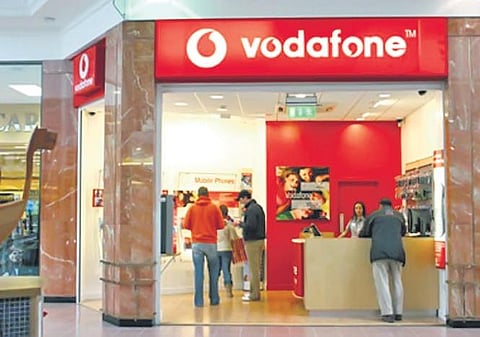

NEW DELHI: Last week telecom operator Vodafone Idea Limited (VIL) decided to convert the interest on spectrum and adjusted gross revenue (AGR) dues into government equity. This means the government will become the highest stakeholder in the country’s third largest telecom company with 35.8% shares.
As the news circulated in the market, the shares of Vodafone Idea went down drastically as many believed the government will take over the company. On the bourses, the shares of Vodafone Idea plunged 21%, but it bounced back 8.5% the next day when the chief executive of ficer of Vodafone Idea Ravinder Takkar rebuffed all these speculations.
“The government, through a letter from the Department of Telecommunications (DoT), has clarified that it does not want its nominee on the board. They have said there is no intention to nominate a person on to the board, we don’t expect it either,” informed Takkar. Overall, the decision of Vodafone Idea received a mixed response from the telecom and market experts.
Many are of the view Vodafone Idea got a lifeline that would save it from bankruptcy or shutting down. A few believe it would help the cash-strap telco to ease its cash flow so that it could use that money to improve its network and spend on 5G spectrum. The presence of the government as a stakeholder will help the company to invite a few investors. However, others differ. They say it is a short-term relief for the telecom operator, and what if it is not able to pay the amount on time.
AGR dues and relief package
The telecommunication industry is said to be very capital intensive as it requires an extensive network infrastructure to provide fixed line and wireless services. The industry needs regular investment to upgrade its technology. For instance, this year, the 5G spectrum auction is round the corner and the telecom operators need a hefty sum of money to bid for it.
Then comes Adjusted Gross Revenue (AGR), which is the usage and licensing fee that telecom operators are charged by the Department of Telecommunications (DoT). At the same time, the telecom operators in India are claiming that it has the lowest Average Revenue Per User (ARPU) in the world. All these things are making these telecom operators difficult to thrive and debts are piling year on year. To give a lifeline to the ailing industry, the government in October 2021 came up with a telecom relief package.
The package includes a fouryear moratorium to repay dues it owed to the government, onetime opportunity to exercise the option of paying interest for the four years of deferment of spectrum and AGR dues by converting the net present. Subsequently, Vodafone Idea and Tata Teleservices decided to convert the interest from AGR dues to government equity. Vodafone Idea had past AGR dues worth Rs 58,254 crore, of which it has already paid Rs 7,854 crore.
As per the company estimates, the net present value (NPV) of this interest is Rs 16,000 crore and the issue price would be `10 per share. Tata Teleservices owes `850 crore to the government as in AGR dues, thus enabling the government to own 9.5% stake in the company. However, Bharti Airtel, which owes around Rs 43,980 crore in AGR dues, of which Rs 18,004 crore had been paid, decided not to opt for converting its interest dues into government equity.
Its impact?
Vodafone is the third largest telco in India with a subscriber base of 27 crore till August 2021. Now the moot question is what the latest move will cost to the company? Prashanth Tapse, vice-president (Research) at Mehta Equities Ltd, said it is just a structural rescue plan to keep Vodafone under survival mode helping the company to breathe in the competitive space and stave off the risk of bankruptcy, which was a concern for equity investors.
“I believe, in the current bleeding environment, it would be very hard to get new investors into IDEA as going forward they will need huge money for capex to expand and upgrade technology and if money doesn’t come in, peers would take undue advantage and lead to loss of opportunity to Vodafone Idea,” said Prashant Tapse. The Motilal Oswal Financial Services said Vodafone Idea will have to increase their tariff to have higher ARPU to be in the game and avoid any major market loss.
“Large-scale capital support is needed to meet the liabilities of Rs 1,94,500 crore. It would also need to invest in the network to arrest the ongoing market share churn, The numbers are startling; therefore, VIL would need to take a tariff hike - leading to an ARPU increase of ~1.9x - to reach a self-sustainable level over the next four years,” said the financial firm. It also mentioned that it may need to grow its revenue approximately three times from current levels and containing the rate of churn should be a priority. “Until VIL has sufficient funds to invest in the network and compete in the market, the subscriber churn may continue to dilute earnings,” said the firm.
However, Kotak Institutional Equities believes the step by Vodafone Idea highlights the lack of confidence on capital raise or cash flow improvement. The firm said the government may end up increasing its stake in VIL further. “In our view, the government may end up increasing its stake in VIL further, as and when the cumulative deferred amount of ~Rs 92,000 crore pertaining to AGR dues and spectrum liabilities becomes payable post the end of the moratorium period. “It is unlikely that VIL will be in any position to service the deferred liabilities in about four years as it continues to lose subscribers and falls short of desirable investments in the network infrastructure to keep up with competition, which is already well ahead in terms of service capabilities,” said the firm.